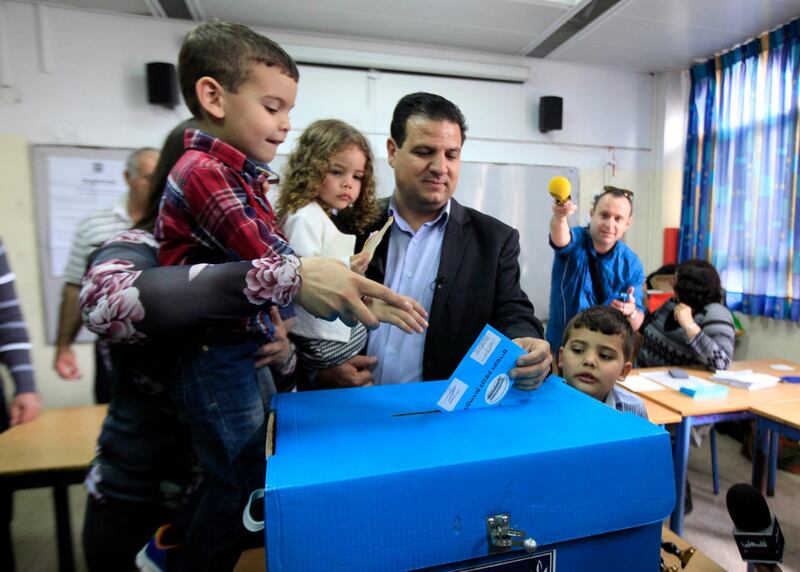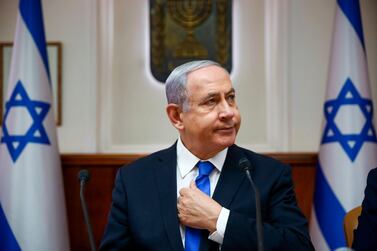Israel's four biggest Arab-majority parties are uniting again under the Arab Joint List in the upcoming parliamentary elections, a move they hope will increase turnout amid Arab voter apathy.
Israelis go to the polls on September 17 in an election that will largely determine embattled Israeli Prime Minister Benjamin Netanyahu's fate after he won the last election in April but failed to form a coalition, sending the country back to the ballot box.
The National Democratic Alliance, also known by its Hebrew acronym, Balad, announced Monday that it will be joining forces with its three previous allies — the Democratic Front for Peace and Equality (Hadash), the Arab Movement for Change (Ta'al), and the Islamist-leaning United Arab List (Ra'am). The latter three had already confirmed their alliance ahead of the August 1 deadline for setting party lists.
"We'll work to improve Arab turnout so the Joint List will be a force to be reckoned with in Israeli politics," Mtanes Shihadeh, the head of Balad, said at a press conference announcing the merger. "We also want to help bring about an end to the [Israeli-Palestinian] conflict."
Arab and Palestinian citizens make up 20 per cent of Israel's 9 million citizens but historically have played a very marginal role in the country's coalition-style national politics.
The Arab parties first aligned in the 2015 election, after Avigdor Lieberman, head of the Yisrael Beiteinu party, pushed through a law to raise the threshold for votes needed to enter parliament in an attempt to keep the Arab parties out.
More than 60 per cent of Arab voters turned out and the Joint List went on to win 13 seats in that election, making it the third largest faction in the 120-member parliament.
Fast forward to the April 2019 election, and the parties divided into two lists, Hadash-Ta'al and Ra'am-Balad, amid ideological and personal infighting. The split left many Arab Palestinian voters disillusioned about their representation in Israel's increasingly extreme-right political climate.
In an election marked by racist rhetoric and a race to the right, Arab voter turnout dropped to just 49 per cent and the parties received a combined 10 seats, with Ra'am-Balad just passing the vote threshold.
Mr Netanyahu's Likud party won the mandate to form the government but an unprecedented deadlock created by Mr Lieberman, his former ally turned arch rival, prevented the prime minister from forming a coalition. Mr Netanyahu, who is facing charges for bribery and fraud, is now desperate to win September's election. He is banking on strong turnout from the right so he can form a coalition without Mr Lieberman's party.
Israel's centre and left, meanwhile, are hoping to block Mr Netanyahu's chances of re-election, and are frantically forming their own tactical alliances.
That has left Arab voters once again facing the decision of whether to vote for their parties, the main source of determining Arab representation on the national scale, or to vote strategically for a stronger Jewish-majority party, or not to vote at all.
Immediately after the April election, leaders of the Arab parties announced they would revive the Joint List, but continued personality and political differences stalled the process.
"The List really shot itself in the foot when it broke up earlier this year," said Amjad Iraqi, a political analyst with the Shabaka Policy Network and +972 Magazine. "It's going to be a massive uphill battle to get the public's support."
Mr Iraqi said that "the ugliness of the process of their break-up" exposed "the extent to which the politicians have become really disconnected from the people ... damaging an important political project for Palestinians in Israel."
Mr Iraqi predicted that the parties would pass the threshold, but that Arab turnout would remain low.
While many Arab voters "don't necessarily believe in Israeli democracy", they vote "because it's a mechanism for decided national leadership" for the Arab Palestinian community in Israel, Mr Iraqi said.
With this traditional organising tool now losing legitimacy, the question that remains, he said, "is how do we re-conceive our leadership in the Palestinian community in Israel? What are the consequences for Palestinians in the state and Palestinian politics as a whole?"






